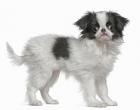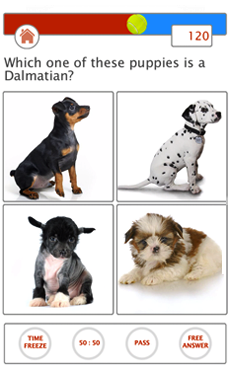Japanese Chin
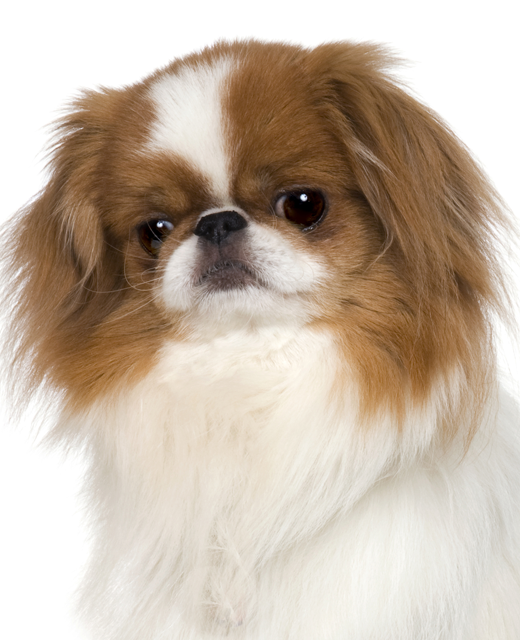
In my own words
I’m so glad you’re home, I really missed you! Can we have a cuddle and then maybe a little walk? I don’t really want to go too far, just far enough to stretch my legs and then we can come home and rest. Good idea, don’t you think?
My kind are have been companion dogs for Asian royalty for centuries you know, that’s why I’m so regal and dignified! I don’t mind playing with the children a little bit as long as they don’t tug my long, silky coat. Isn’t my coat lovely? I make sure I keep it nice and clean so I look really smart all the time! Anyway, can we have that cuddle now?
My ideal owner(s)
Families with older children
Retirees
Singles
City dwellers
What they say about me
Charming
Devoted and loving
Dignified
Affectionate
Please read on, to find out more about me, and whether I will be someone you can be happy with for the next 10 years, or even longer!
Is this Japanese Chin for you?
Test your knowledge about the Japanese Chin
Information essential about the Japanese Chin
Kennel Club Group:
Toy
Size:
The Breed Standard does not specify a height but instead states that the "daintier the better, providing type, quality and soundness are not sacrificed."
Small: Weight 4 – 15 lb (1.8 – 6.8 kg)
Height 7 – 11” (18 – 28 cm)
Popularity:
Breed History:
The Japanese Chin actually originated in China. This breed was cherished by both Chinese and Japanese nobility for centuries and were often offered as a royal gift, they could never be purchased. Some enthusiasts believe the breed made its way to Japanese after being given as a gift from Korea to the Japanese court. In 1853 this breed gained in popularity when a pair was given to Queen Victoria. They were spread through American and Europe by being gifted from one ruler to another
In 1964 they were honoured as one of Japan’s national symbols and was originally named the Japanese Spanish until the AKC changed the name in 1977. Today this breed has a small following in the United States but is highly adored in Japan. They are best suited to living life indoors and as a close companion.
Character:
This breed is affable and pleasant, being best suited to life as a companion breed as they will develop a deep and strong bond with its family. They get on well with other household pets but can be easily startled by young children. They are a fine boned, dainty breed with a square shape. The Japanese Chin has an inquisitive expression and Oriental appearance and is a true aristocrat – lively and high stepping. They were originally bred to be a pampered companion, a role which they still maintain today.
Temperament:
The Japanese Chin is intelligent, loving and pleasant and are very affectionate, mild mannered and playful. They are adept at mirroring the mood of those around them and are deeply devoted to their master but love everyone. They are gentle and sensitive, being best suited to homes with older children and are good with other dogs and pets. They are not excessive barkers but make good watchdogs and thrive on being the centre of attention. They are full of courage and have a mind of their own. They have an excellent memory with definite likes and dislikes, never forgetting friend or foe and as a family pet the Japanese Chin is unrivalled.
Conformation:
The Japanese Chin is small, square, dainty and light boned covered in a straight and silky coat. Their large, wide heads have short, broad muzzles, widely set eyes and V-shaped ears that hang low. They have medium-length necks that are somewhat thick, short but level backs and plumed tails that carry over the back. Their long, silky coats usually come in red and white, black and white or black, white and tan. Overall, Japanese Chins have a lively but dignified look.
Coat:
The coat is thick, straight, long and silky. The fur is more profuse around the neck and chest. The ears and tail are feathered. Their fine coat stands off the body and is white in colour with patches of black, yellow, sable, orange, brindle, and red. This breed is an average shedder.
Colour:
The coat comes in black and white, red and white or black, white and tan.
Training:
This breed is more obedient than most other toy breeds. Training is easy as they are always eager to please. They excel at learning and performing new tricks. They can be sensitive and mild mannered so harsh or heavy handed training methods should not be used with this breed. They respond best to gentle, loving, fair and consistent training and basic obedience is recommended
Care:
This breed requires daily gentle combing and brushing to keep the coat free from tangles. Occasional professional grooming can keep the coat looking in great condition. Bathe only when necessary and dry shampoo occasionally. The eyes and ears should be checked regularly for infection
Health:
The lifespan of a healthy individual is up to 10. If you buy from a reputable, responsible breeder, health problems should not occur. This breed is generally healthy but its compact muzzle can cause breathing difficulties. They have a tendency to develop eye infections and heat stroke. They can suffer heart problems and joint ailments.
Exercise:
This breed requires a minimal amount of exercise. They enjoy a short walk or play session daily. They are perfectly suited to apartment living but do benefit from having the opportunity to play in a small, securely fenced yard. It is important to remember that they are highly sensitive to extreme temperatures.
You may also like:
If you like Japanese Chins, you may be interested in breeds of the same size »
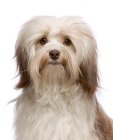
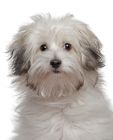
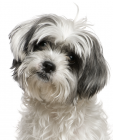
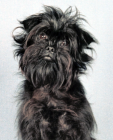

If you like Japanese Chins, you may like other breeds with similar characteristics »
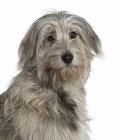
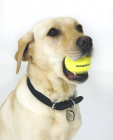

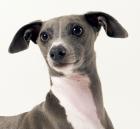
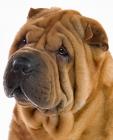
If you like Japanese Chins, you may be interested in these other toy dogs »


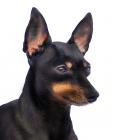

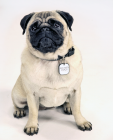
Advice on choosing your breed »
Find an animal shelter or rescue home where a Japanese Chin is waiting for a new home »
The following grid gives a fast track review which covers all breeds. You can apply it to help you decide if a Japanese Chin is suitable for you, the environment where you live, your personality and your lifestyle. On the grid, 1= strongly disagree, and 5= strongly agree. For example, if you are looking for a dog that is suitable for urban living, look down the list under Environment, and you will see that Japanese Chins are perfectly suited to apartment life, scoring 5. If you want a companion that doesn’t need excessive amounts of exercise, look down at Time and Energy, and you will see that Japanese Chin are happy with minimal exercise. You might like to save or print off this section and keep it for reference while you check some other breeds before making your final choice
Be the first to rate this breed »
|
*PLEASE NOTE: All our breed profiles are general, and all dogs are individuals. Always talk to the breeders and meet the owners you are buying from. Try to meet the dog and its parents if it is a puppy in their home environment.









